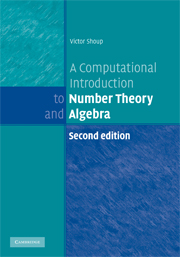Book contents
- Frontmatter
- Contents
- Preface
- Preliminaries
- 1 Basic properties of the integers
- 2 Congruences
- 3 Computing with large integers
- 4 Euclid's algorithm
- 5 The distribution of primes
- 6 Abelian groups
- 7 Rings
- 8 Finite and discrete probability distributions
- 9 Probabilistic algorithms
- 10 Probabilistic primality testing
- 11 Finding generators and discrete logarithms in ℤ*p
- 12 Quadratic reciprocity and computing modular square roots
- 13 Modules and vector spaces
- 14 Matrices
- 15 Subexponential-time discrete logarithms and factoring
- 16 More rings
- 17 Polynomial arithmetic and applications
- 18 Linearly generated sequences and applications
- 19 Finite fields
- 20 Algorithms for finite fields
- 21 Deterministic primality testing
- Appendix: Some useful facts
- Bibliography
- Index of notation
- Index
1 - Basic properties of the integers
Published online by Cambridge University Press: 05 February 2015
- Frontmatter
- Contents
- Preface
- Preliminaries
- 1 Basic properties of the integers
- 2 Congruences
- 3 Computing with large integers
- 4 Euclid's algorithm
- 5 The distribution of primes
- 6 Abelian groups
- 7 Rings
- 8 Finite and discrete probability distributions
- 9 Probabilistic algorithms
- 10 Probabilistic primality testing
- 11 Finding generators and discrete logarithms in ℤ*p
- 12 Quadratic reciprocity and computing modular square roots
- 13 Modules and vector spaces
- 14 Matrices
- 15 Subexponential-time discrete logarithms and factoring
- 16 More rings
- 17 Polynomial arithmetic and applications
- 18 Linearly generated sequences and applications
- 19 Finite fields
- 20 Algorithms for finite fields
- 21 Deterministic primality testing
- Appendix: Some useful facts
- Bibliography
- Index of notation
- Index
Summary
This chapter discusses some of the basic properties of the integers, including the notions of divisibility and primality, unique factorization into primes, greatest common divisors, and least common multiples.
Divisibility and primality
A central concept in number theory is divisibility.
Consider the integers ℤ = {…,−2,−1, 0, 1, 2, …}. For a, b ∈ ℤ, we say that adividesb if az = b for some z ∈ ℤ. If a divides b, we write a | b, and we may say that a is a divisor of b, or that b is a multiple of a, or that b is divisible bya. If a does not divide b, then we write.
We first state some simple facts about divisibility:
Theorem 1.1. For all a, b, c ∈ ℤ, we have
(i) a | a, 1 | a, and a | 0;
(ii) 0 | a if and only if a = 0;
(iii) a | b if and only if − a | b if and only if a | −b;
(iv) a | b and a | c implies a | (b + c);
(v) a | b and b | c implies a | c.
Proof. These properties can be easily derived from the definition of divisibility, using elementary algebraic properties of the integers. For example, a | a because we can write a · 1 = a; 1 · a because we can write 1 · a = a; a | 0 because we can write a · 0 = 0.
Information
- Type
- Chapter
- Information
- Publisher: Cambridge University PressPrint publication year: 2008
